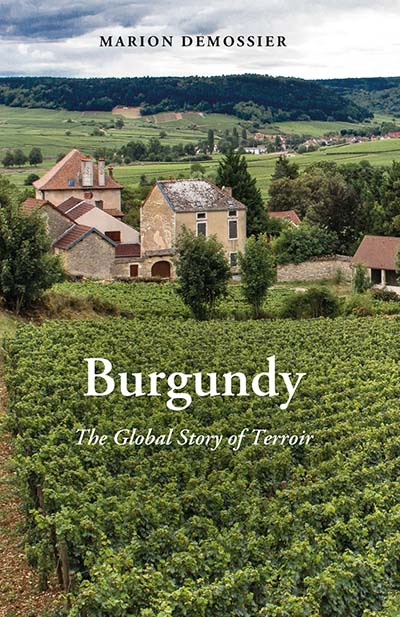“One of the ethnography’s strengths lies in the theoretical frameworks that are used to delve further into the construction of a good that circulates globally and whose value is closely associated with a heritage site. Another is the author’s long-term engagement with the region: this insider status offers a unique perspective on groups of people who are not easy to access… I would recommend this book for both graduate and undergraduate teaching. The chapters stand well on their own and the volume as a whole offers an excellent example of long-term ethnographic research.” • JRAI
“Demossier’s engrossing analysis of Burgundy—the wine, the place, the brand—should be imbibed (pun intended!) on many levels—and slowly, for best appreciation… This excellent book is appropriate for upper division, graduate students and professionals in a number of fields—anthropology, sociology, wine studies, marketing and business and women’s studies.” • foodanthro.com
“Overall, the book delivers on its promise to excavate the layers of meaning that have contributed to defining and redefining a region, its product, and its land.” • H-France Review
“Demossier’s book offers a candid glimpse into a fascinating world in which one should not always believe what one hears or sees…a careful reading of [her] work sheds light on more than just the narrow world that it purports to study.” • Journal of Wine Economics
“Apart from those interested in the academic aspects of food and wine, this book would be beneficial to non-academics looking to learn more about the complexities of the wine world. Overall, through her rich account and transnational approach including over two decades of fieldwork, Demossier’s landmark work Burgundy further legitimizes wine as a topic of academic interest and is sure to captivate oenophiles and food scholars alike.” • Graduate Association of Food Studies
“Burgundy speaks to a variety of issues beyond winemaking and will be of interest to many scholars working in other fields. Through her innovative approach to ‘global anthropology,’ Demossier contributes to broader debates within food studies, globalization/global capitalism, and geographies of heritage and would be appreciated by an interdisciplinary audience as much as by fellow anthropologists.” • Europe Now
“…a work that is a compelling narrative of a scholar deeply absorbed in her subject—one written with grace and balance, at once academically rigorous yet effortlessly readable… In conclusion, this book has the potential to become a very important point of reference on issues well beyond winemaking and to capture a wide audience of educated readers and wine lovers, not to mention intrigued academics.” • The World of Fine Wine
“[This study] is clearly structured and written in the strongly personal voice of a scholar deeply immersed in her subject, which she has been researching for more than two decades. The book has the potential to become an important point of reference for future research on a range of issues beyond wine-making.” • Ullrich Kockel, Heriot-Watt University, Edinburgh
“A rare gem: well-conceived, beautifully written, carefully illustrated, loaded with original insights—this book has the potential to capture a wide audience of educated readers and wine lovers (not to mention intrigued academics)… What takes this book far beyond what is currently on the market is the author’s genuinely transnational approach.” • Kolleen M. Guy, University of Texas, San Antonio
“The most revealing study to date of the social construction of the concept of terroir… A landmark work on the politics of identity in the present age of food and drinks globalization.” • Julie McIntyre, University of Newcastle, Australia
“Demossier’s engrossing analysis of Burgundy—the wine, the place, the brand—should be imbibed (pun intended!) on many levels—and slowly, for best appreciation.”—foodanthro.com
Drawing on more than twenty years of fieldwork, this book explores the professional, social, and cultural world of Burgundy wines, the role of terroir (the environmental factors that affect a crop's character), and its transnational deployment in China, Japan, South Korea, and New Zealand.
It demystifies the terroir ideology by providing a unique long-term ethnographic analysis of what lies behind the concept. While the Burgundian model of terroir has gone global by acquiring UNESCO world heritage status, its very legitimacy is now being challenged amongst the vineyards where it first took root.
From the introduction:
Superficially then, Burgundy might appear to be simply acquiring recognition for its unchanging landscape, tradition and culture. Yet, for all the power of its rich local identity, folklore and culture which is broadcast to the world, there hides underneath the comforting blanket of this seamless place, untouched by change or conflict, a far more complex reality. Burgundy’s listing as a World Heritage landscape emphasises its international reputation as a traditional and historical site of wine production and opens a new chapter in the production and marketing of its quality, differentiation and authenticity. It is also about readjusting Burgundy and the grands crus in response to a changing global market and the shifting kaleidoscope of world wine values.
Marion Demossier is Professor of French and European Studies and Head of the Department of Modern Languages at the University of Southampton, and holds a PhD in Social Anthropology from the EHESS (École des Hautes Études en Sciences Sociales) in Paris. She has been involved as an expert with the wine industry in France and New Zealand and is a member of the UNESCO network Chair Culture of Wine, Dijon since 2006.
LC: TP553 .D389 2018
BL: DRT ELD.DS.280089
BISAC: SOC055000 SOCIAL SCIENCE/Agriculture & Food; CKB126000 COOKING/Beverages/Alcoholic/Wine; SOC002010 SOCIAL SCIENCE/Anthropology/Cultural & Social
BIC: JHMC Social & cultural anthropology, ethnography; WBN National & regional cuisine


